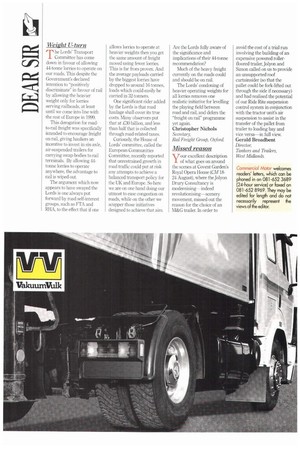Weight U-turn T he Lords' Transport Committee has come down in
Page 28

If you've noticed an error in this article please click here to report it so we can fix it.
favour of allowing 44-tonne lorries to operate on our roads. This despite the Government's declared intention to "positively discriminate" in favour of rail by allowing the heavier weight only for lorries serving railheads, at least until we come into line with the rest of Europe in 1999.
This derogation for roadto-rail freight was specifically intended to encourage freight on rail, giving hauliers an incentive to invest in six-axle, air-suspended o-ailers for carrying swap-bodies to rail terminals. By allowing 44tonne lorries to operate anywhere, the advantage to rail is wiped out.
The argument which now appears to have swayed the Lords is one always put forward by road self-interest groups, such as FTA and RHA, to the effect that if one allows lorries to operate at heavier weights then you get the same amount of freight moved using fewer lorries. This is far from proven. And the average payloads carried by the biggest lorries have dropped to around 16 tonnes, loads which could easily be carried in 32-tormers.
One significant rider added by the Lords is that road haulage shall cover its true costs. Many observers put that at £30 billion, and less than half that is collected through road-related taxes.
Curiously, the House of Lords' committee, called the European Communities Committee, recently reported that unrestrained growth in road traffic could put at risk any attempts to achieve a balanced transport policy for the UK and Europe. So here we are on one hand doing our utmost to ease congestion on roads, while on the other we scupper those initiatives designed to achieve that aim. Are the Lords fully aware of the significance and implications of their 44-tonne recommendation?
Much of the heavy freight currently on the roads could and should be on rail.
The Lords' condoning of heavier operating weights for all lorries removes one realistic initiative for levelling the playing field between road and rail, and defers the "freight on rail" programme yet again.
Christopher Nichols Secretary, Rail Freight Group, Oxford




























































































